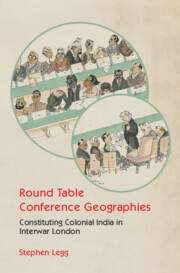Book contents
- Frontmatter
- Contents
- List of Figures and Tables
- Acknowledgements
- Note on Conversions, Spellings and Abbreviations
- 1 Introduction: Squaring Round Tables
- Part I Geographical Imaginations
- Part II Conference Infrastructures
- Part III The Conference City
- Part IV Representations
- Notes
- References
- Index
- Miscellaneous Endmatter
12 - Conclusion: Squaring Round Tables
Published online by Cambridge University Press: 15 January 2023
- Frontmatter
- Contents
- List of Figures and Tables
- Acknowledgements
- Note on Conversions, Spellings and Abbreviations
- 1 Introduction: Squaring Round Tables
- Part I Geographical Imaginations
- Part II Conference Infrastructures
- Part III The Conference City
- Part IV Representations
- Notes
- References
- Index
- Miscellaneous Endmatter
Summary
So, what happened at the Round Table Conference (RTC)? The answer to that question depends upon our assumptions about how interwar diplomatic politics functioned and about how much of that functioning was recorded. One model, premised on the machinations of grand and petty sovereigns, would use the archive to unveil an overarching, ideological strategy. Being a secret strategy, its archive would necessarily be dispersed and fragmented. We have read, for instance, of the master of Corpus Christi College, Oxford, indiscreetly sharing Sankey’s admission that Hailey was feeding him positions to take to the Federal Structure Committee. Benthall likewise confided to his diary that Hailey and his Government of India advisors had come to the conference with a complete scheme devised and fed it to Sankey and others. This hints at a strategy being played at the conference, but was the conference itself a rigged host? We have seen that it functioned as an unfree, unequal but effective space, yet can we evidence a self-conscious and pre-figured scheme on these lines? Some documents could be read in that light.
Sir Claude H. Hill had joined the Indian Civil Service in 1887 and rose to appointment in the Viceroy’s Executive Council. In the spring of 1918, he helped organise the Delhi ‘War Conference’ with leading Indian politicians, including Gandhi. After retiring in 1921 he returned home and later became the lieutenant governor of the Isle of Man. From this position he wrote to MacDonald on 11 August 1930, two months before the RTC opened, claiming that down to his experience in 1918 ‘I doubt anyone else has had a similar opportunity of studying the psychology of a heterogeneous gathering of the Indian intelligentsia’. He encouraged an opening discussion with a pre-set agenda, suggesting that ‘many of the speeches will be extreme, and foolish; and probably wholly unconstructive. They will, however, be mutually destructive in so far as they are impracticable. But it is of real importance that a full opportunity be given for their utterance’. The British heads of committee should be sure of the outcomes they wanted before their work began as ‘it is almost certain that, if complete freedom of discussion in sub-Committee is allowed, the different interests represented will find that their different aspirations and demands [are] incompatible with an agreed scheme’.
- Type
- Chapter
- Information
- Round Table Conference GeographiesConstituting Colonial India in Interwar London, pp. 334 - 343Publisher: Cambridge University PressPrint publication year: 2023



